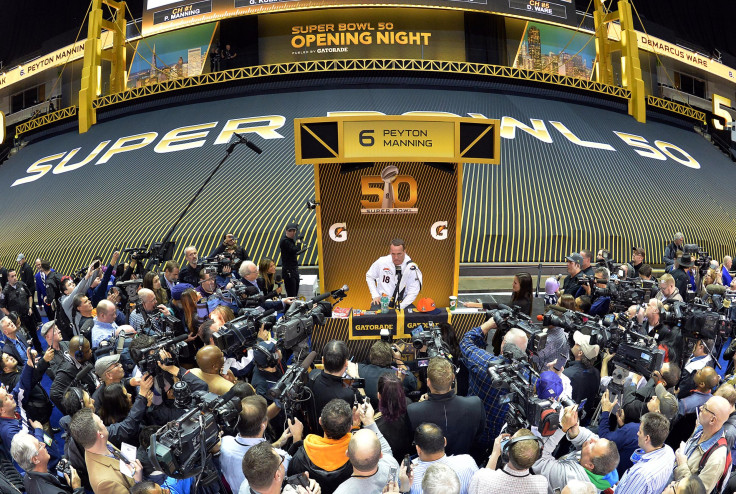Peyton Manning's Legacy After Super Bowl 50: Amid HGH Claims, Denver Broncos QB's Marketing Star To Shine

For the past 15 years or so, Peyton Manning has been all but unavoidable. Sure, he regularly tossed touchdowns on Sundays and won a Super Bowl, but his seemingly ubiquitous commercial presence that pitched TV audiences — over and over again — the merits of MasterCard, Sprint cellphone plans and Papa John's pizza, among other products, also helped him become a household name with NFL fans and non-football watchers alike.
Long a prized marketing asset, the Denver Broncos quarterback is rumored to be playing his final NFL game in Sunday’s Super Bowl 50 matchup against the Carolina Panthers. Manning's triumphant final ride in the big game should read like movie script, but recent allegations connecting him to a banned substance could threaten an unhappy ending. Despite his first-ever real scandal, a possible second Super Bowl championship and years of goodwill stocked up for the NFL's top pitchman will likely keep him as a favorite to represent high-profile brands well into retirement, sports marketing experts said.
"He seems to be one of these iconic stars who manage to rise above this stuff as long as something new or damning doesn’t come out," said Bob Dorfman, sports marketing expert at Baker Street Advertising in San Francisco.
Al Jazeera released a documentary linking Manning to human growth hormone in late December. It alleged that HGH was delivered to Manning's home under his wife's name as the quarterback recovered from neck surgery in 2011. He has vehemently denied ever using any performance-enhancing drugs and recently said a NFL investigation into the matter will find a "big fat nothing."
Manning signed with the Broncos in 2012 after being released by the Indianapolis Colts. Despite diminished arm strength seemingly connected to his injuries, Manning has helped lead Denver to two Super Bowl appearances, counting 2016.
Rumors have surfaced that Sunday's matchup with the Panthers could be his final game before retirement. After Denver beat the New England Patriots in the AFC Championship, microphones picked up Manning telling Patriots Coach Bill Belichick that "this might be my last rodeo." Later NFL Network's Ian Rapoport reported that Manning had let friends know Super Bowl 50 was probably his last game.
In what could be his final season in an 18-year NFL career, Manning remains the top endorsement draw in the NFL, earning some $12 million in 2015 through marquee sponsorships like Nationwide, Nike, Gatorade, Papa John's and DirecTV, according to Forbes. Manning has crafted a funny, everyman image that has helped him land so many deals.
"[He's] the guy next door from Louisiana, soft-spoken," said Matt Delzell, managing director at the Marketing Arm, a marketing and promotion agency that measures engagement. "He feels like he could be the dad of one of the kids on your kids' soccer team."
The new scandal hasn't hurt Manning among consumers — at least, not yet. His legacy as a likable, successful athlete has held steady. The Marketing Arm's data found Manning ranked near the likes of Oprah Winfrey in terms of trust among the public and alongside Jimmy Fallon and Derek Jeter in terms of influence. Typically athletes rank lower in trustworthiness because fans of opposing teams hold grudges, but "Peyton is a little bit of anomaly in that his trust scores are phenomenal across the population," Delzell said.
Manning's nationwide appeal has helped keep him largely safe from the fallout that usually accompanies a scandal. A survey released by ESPN Wednesday found 78 percent of respondents view him favorably. The poll also found 90 percent of respondents said the HGH report did not change their opinion of Manning, while just 6 percent said it did.
Manning is not entirely in the clear from the HGH allegations, however. It's difficult to disprove rumors, and the idea has at least entered consumers' minds. No brand attached to Manning has suggested it will desert the Broncos quarterback, but that could change if new reports emerge that catch on with the public. Scott Bukstein, associate program director and professor of sport business management at the University of Central Florida, speculated that Manning could see opportunities fall off by 10 to 20 percent should that happen.
Heading into retirement, Manning was as well-positioned as any athlete to continue pulling in brand money. He's often seen in commercials selling insurance, pizza and satellite television, which aren't tied to on-field performance. Manning's demographic might skew older in retirement, which could rule out some athletic-minded brands, but it could also open doors to new products. Former NBA superstar Shaquille O'Neal endorses pain-relief products, and legendary NFL quarterback Joe Montana is featured in ads for Sketchers walking sneakers, for instance.
But for now there's still a small rain cloud overhead for Manning. "With these allegations it makes things a little more difficult," Bukstein said. "He’d be able to write his ticket for the rest of his career if he didn’t have these outstanding allegations."
But there's an adage in sports, most famously employed by golfer Tiger Woods, that "winning takes care of everything." Should Manning retire atop the sport after winning his second Super Bowl Sunday, it would go a long way to creating a narrative advertisers would love to sell.
"If the Broncos win, I would see it as an ideal time to retire," Bukstein said. "That’s a compelling story ... I believe [Manning] would sign new endorsement deals within the next two weeks if they win."
© Copyright IBTimes 2024. All rights reserved.






















